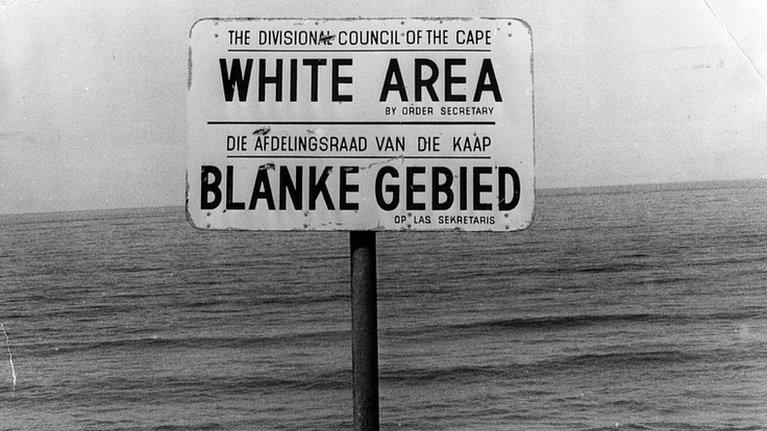Rugby and apartheid: 50 years on from the 'Battle of Swansea'
- Published
Rugby and apartheid: How a game became part of the battle
In the fight to end South Africa's brutal apartheid regime, 15 November 1969 would prove a "seismic" day.
A peaceful demonstration against the visiting South Africa rugby team in Wales sent shockwaves not only around the sporting world - but the political one too.
The violence against protestors was branded the "Battle of Swansea", with hundreds hurt and arrested.
Yet exactly 50 years later Siya Kolisi lifted the 2019 Rugby World Cup In Japan.
Few in 1969 were even willing to contemplate, let alone imagine, a black player as captain of the Springboks - the pride of the white South African community.
Nelson Mandela had already spent five of his 27 years imprisoned under a political system of institutional discrimination.
A year earlier England had cancelled a cricket tour to South Africa after their mixed-race player Basil D'Oliveria was refused entry.
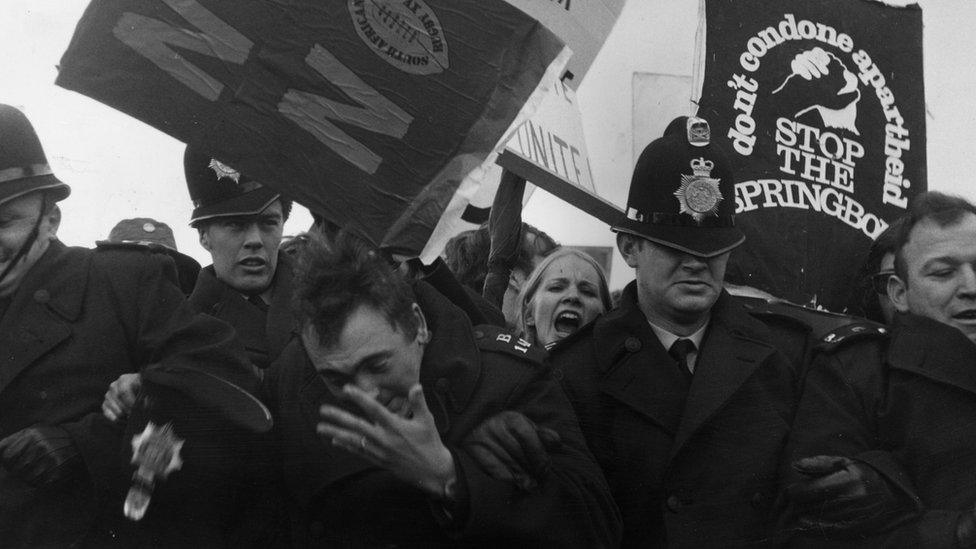
Protestors were determined to stop South Africa's cricketers touring the UK in 1970
So when South Africa's rugby team - closed to black players - headed to the UK, protestors embarked upon a campaign of disruption.
"I knew we were in for a rough time but I had no idea how well organised it would be," said their vice-captain Tommy Bedford.
"We had never had to cope with these sorts of demonstrations in our country or in sport, so I didn't think it was going to be an easy tour.
"But I felt strongly that if these 30 men from the white South African community could go out and see how things are elsewhere, they may go back and say 'that's how things should be back home'."
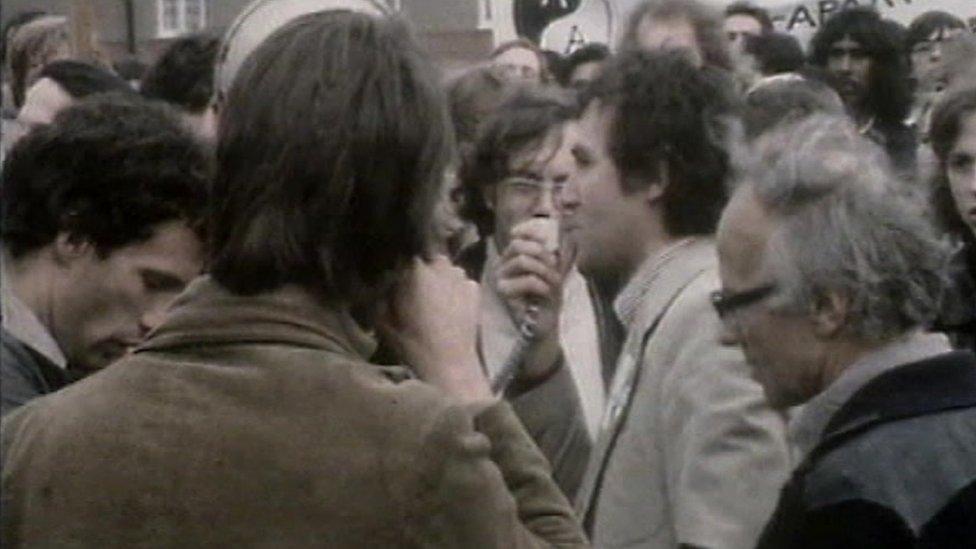
Anti-apartheid campaigner Peter Hain (holding microphone) was branded a "traitor" by some of the white community in South Africa
Led by Peter Hain, then a 19-year-old student, and with the help of future Prime Minister Gordon Brown in Edinburgh, they were hell-bent on causing so much trouble that South Africa's cricketers - due to tour the following year - would not even step foot in the UK.
The world was slowly waking up to the horrors of apartheid - however rugby was not listening.
"Frankly it was a dialogue with the deaf between anti-apartheid protestors, and players and spectators," said Lord Hain, now a member of the House of Lords.
"We tried to engage with them to say they were collaborators with the most evil and racist system in the world, but they just thought we were interfering with their game - and they really hated us for it."
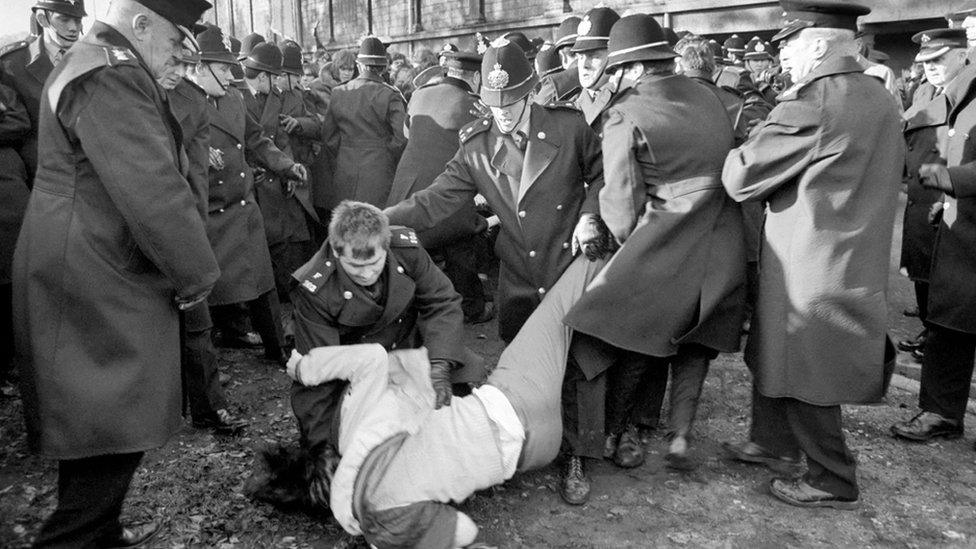
"It was a military-style operation" said Hywel Francis of the policing that day
Demonstrations were held at the opening games at Twickenham, external, Leicester and Newport but the game against Swansea would prove a tipping point.
A protest at the city's civic centre passed without incident - until the march arrived at the gates of St Helen's rugby ground.
"We all felt it was so important to demonstrate, but it was peaceful and everyone was in a happy mood," recalled Mair Francis.
"But then there was a command by the police to turn into us and push us all into the sea wall opposite the grandstand.
"People were hysterical, screaming for the police to stop pushing because we couldn't breathe. Some boys climbed up the wall and started pulling us up."
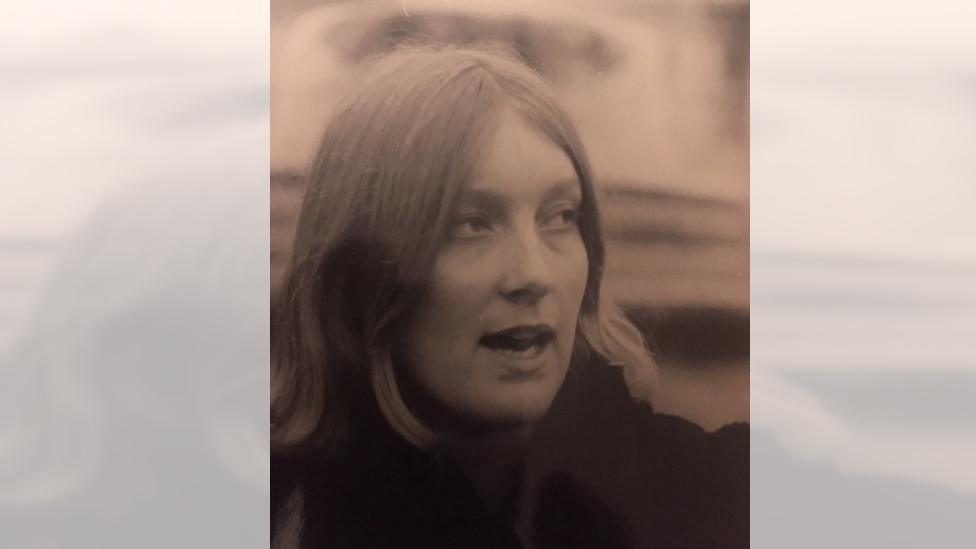
Mair Francis said the scenes that day were "horrific"
Inside the ground, the cacophony of noise from the protest had an unnerving effect on the players preparing for - for some - the biggest game of their lives.
"It would be true to say that I, as captain, the rest of the team, the club and indeed rugby in general chose to ignore the moral issue, a stance which my daughters would not be happy with, if it happened today," said Swansea skipper Stuart Davies.
"Morrie Evans, the coach, and I were glad to usher the players into the dressing room to try to keep them calm, but the noise from the protest was daunting.
"There was an eerie feeling on the field throughout the match which affected us all and it would be true to say that the Springboks were saddened by the experience."
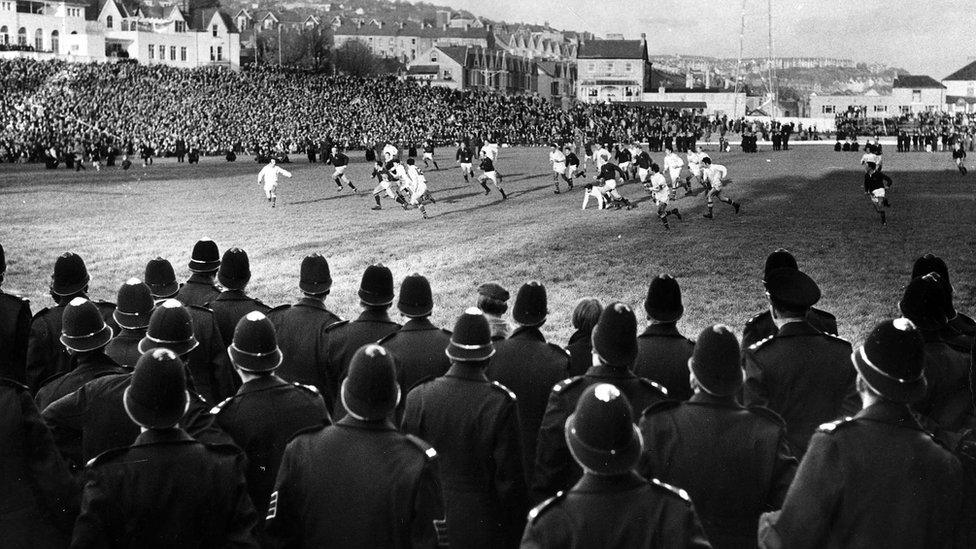
Many complaints were made over the conduct of the recently formed South Wales Police force that day
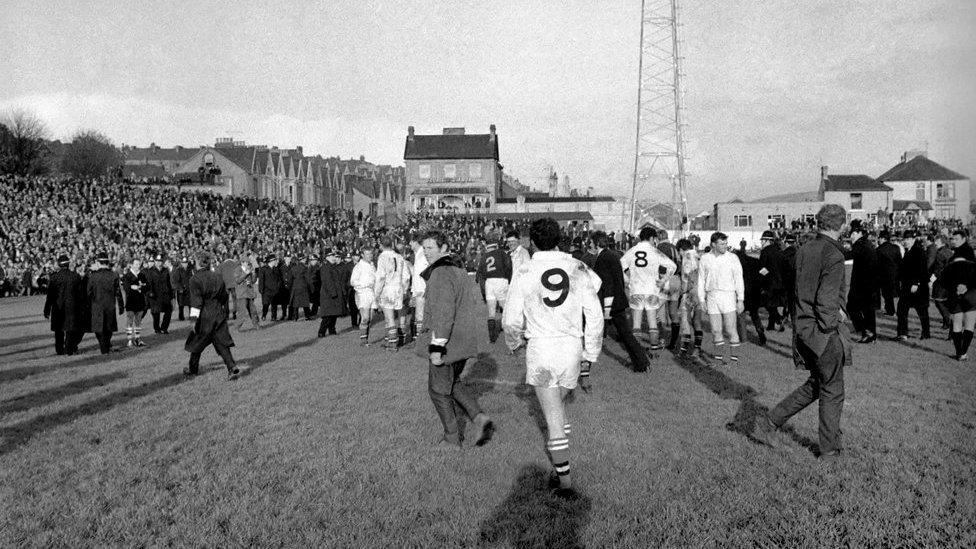
"We wondered what the hell was going on," said Stuart Davies
The anti-apartheid movement was accused of blighting sport with politics.
Nevertheless, early in the second half, protestors stormed the pitch en masse, lying on the turf to halt the match in passive defiance.
However the brutality of "vigilantes" - stewards hired by the club to bolster the police effort - made headlines around the world.
"Swansea was particularly nasty and became a seismic event," said Lord Hain.
"The protestors were thrown off the pitch to the vigilantes, who had been recruited from local clubs to give them a real belting.
"I was shocked when I discovered a friend had a broken jaw and a woman demonstrator almost lost an eye."
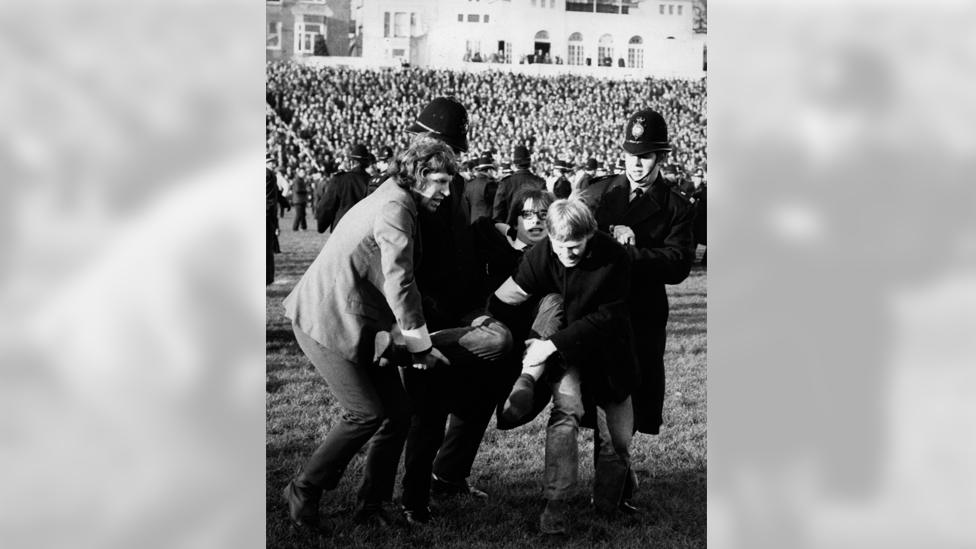
Protestors were under order to "go limp" and not put up physical resistance
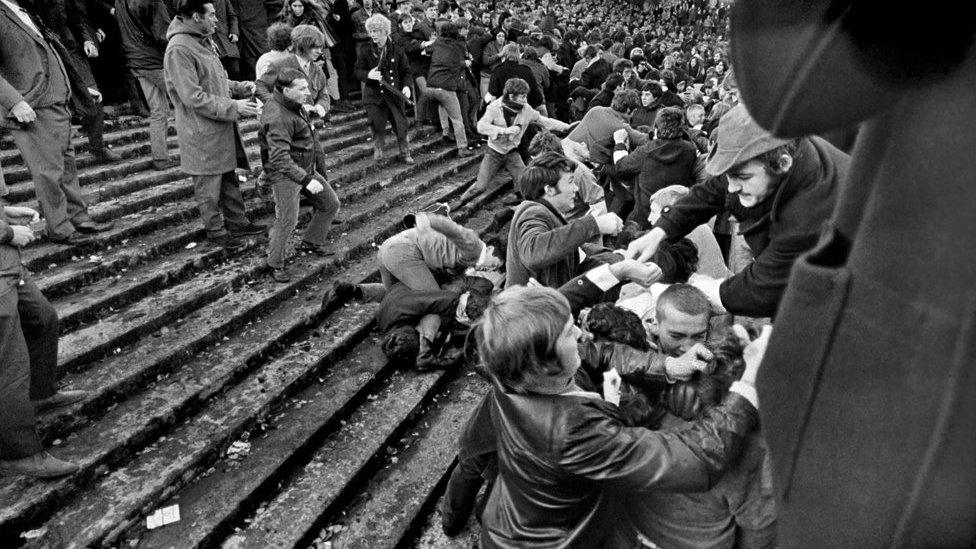
Many of the pitch invaders were thrown to the angry rugby fans
More than 100 people were hurt, including 11 police officers.
Such was the shock that, within days, Parliament discussed potentially halting the tour, external.
The then-Home Secretary and future Prime Minister James Callaghan stopped short, claiming cancelling events people disliked would be a "dangerous and slippery slope".
However he ordered a meeting of all chief constables to discuss policing the rest of the tour.
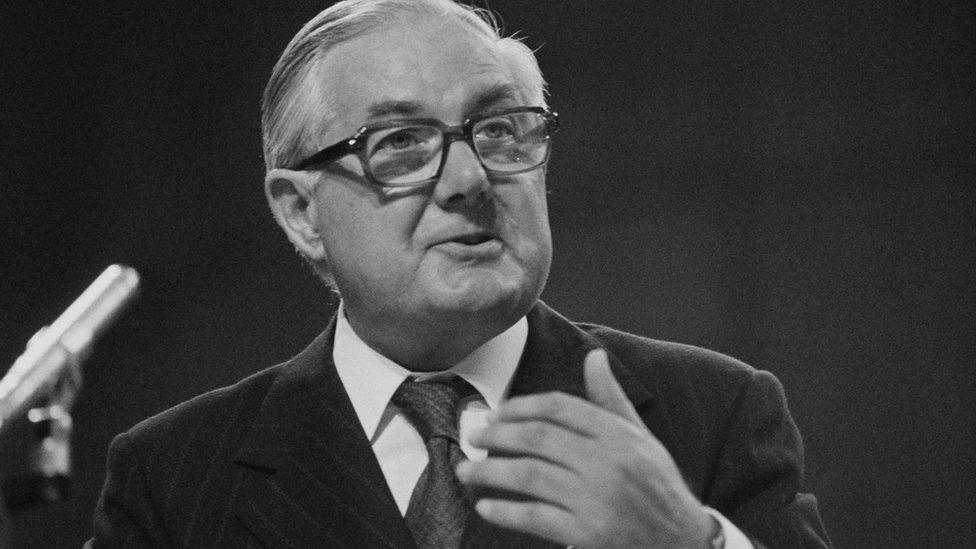
Then-Home Secretary James Callaghan criticised the role of the stewards at St Helen's
"Among the questions that I shall ask to be examined is the extent to which stewards are helpful," Mr Callaghan told Parliament.
"It is clear that their behaviour at Swansea caused a great deal of public disquiet."
Larger protests followed and every game was played in an atmosphere of violence and heavy policing - but there was no repeat of the Swansea violence.
Eyewitness and future MP Hywel Francis said what happened in Swansea was "unrepresentative".
"Our protest went over a lot of people's heads at the time but the violence grabbed the headlines and has resonated down the decades," he said.
"It was the beginning of an awareness, not just as progressive people showing solidarity with the black people, but of a worldwide campaign against South Africa.
"What we did was very small, but we did what we could. Rugby is important but it's not more important than people's human rights."
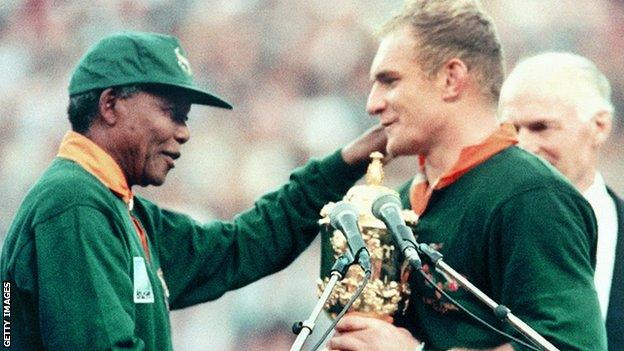
Nelson Mandela was elected president in 1994, the year before South Africa's historic Rugby World Cup victory
Manchester and Aberdeen witnessed large-scale demonstrations while a game in Belfast was cancelled.
In London, the Springboks team bus was even "hijacked" by a protestor on the morning of the Test against England.
"We spent all our time surrounded by police cordons and barbed wire, never mind having our bus hijacked," said Bedford.
"The shocking thing to me was no-one was defending us. Our management was saying nothing, the [home unions] were hardly saying boo to a goose. Although it wasn't an easy team to defend, you could defend the right to be there."
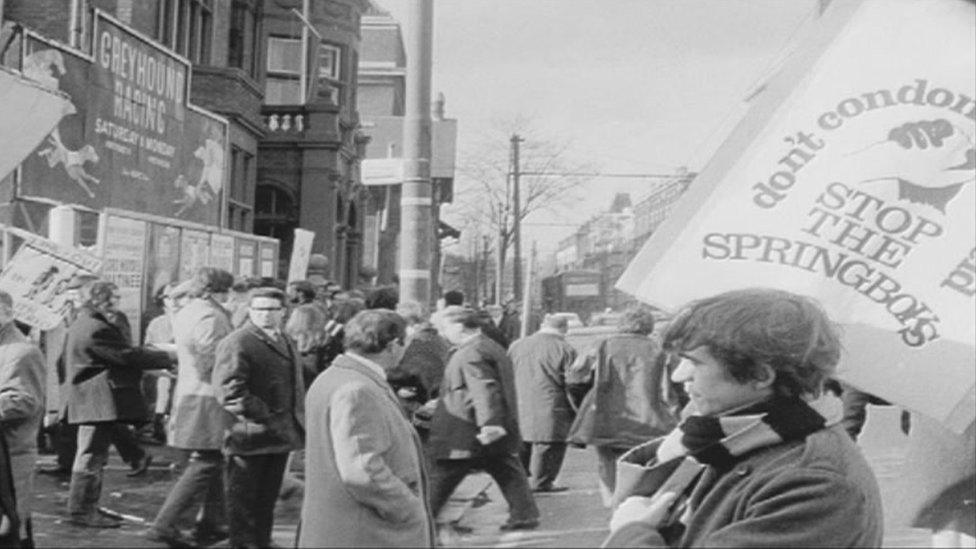
The Welsh anti-apartheid movement was claimed to be "among the most effective" in the world at the time
Despite a news blackout, the fallout even reached Nelson Mandela's prison on Robben Island, where the Springbok-supporting prison guards were furious.
"They took it out on Nelson Mandela and his comrades but didn't realise that in doing so, they were communicating something special - that there were thousands of people protesting for their freedom," said Lord Hain.
"He told me it was an enormous moral boost during very dark times for the anti-apartheid movement."
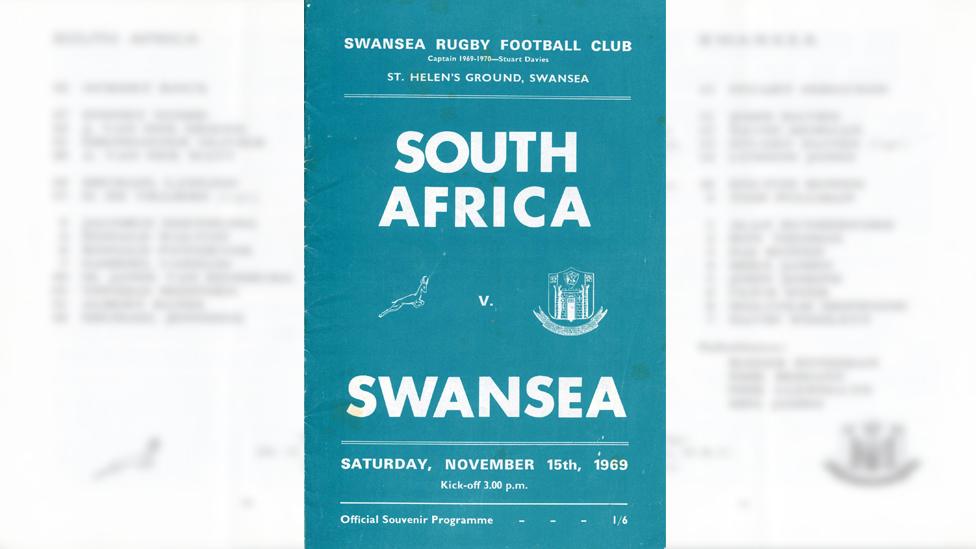
Swansea captain Stuart Davies admits "no-one remembers the match"
Tom Bedford also suspected change was in the air.
"On our last night in Wales I thought it's going to be very difficult for future tours to take place under such circumstances," he said.
"My feeling was there would have to be a political journey. But I was only playing rugby, this wonderful game that had been sullied. How could you approach and tackle this issue?
"For me it became a very difficult personal journey back to South Africa which got me into a lot of trouble in the end."
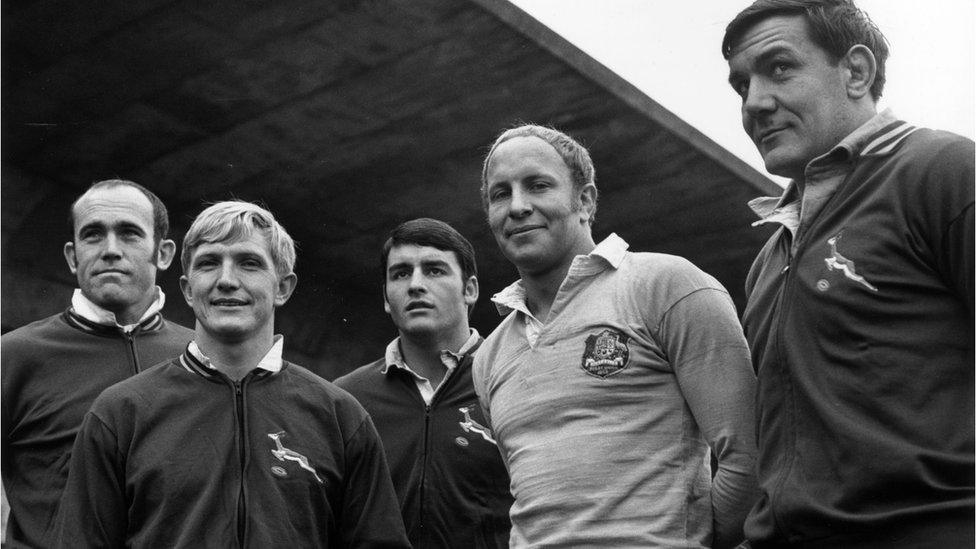
Tommy Bedford (second from right) would become a vocal critic of the apartheid regime in his homeland
His anti-apartheid stance is suspected of causing the premature end of his international career just two years later.
The 1970 South Africa cricket tour was scrapped, the start of a worldwide boycott of South African teams and athletes in sports including football, cricket and the Olympics that would last 25 years.
Bedford would later defy his government by attending the historic Dakar Conference in 1987 with the exiled African National Congress, to set about the foundations for fundamental political change in South Africa - and the ultimate collapse of the apartheid regime.
Exactly 50 years on from that troubled tour the "unthinkable" happened when South Africa's first black rugby captain led the Springboks to the biggest prize in the sport.
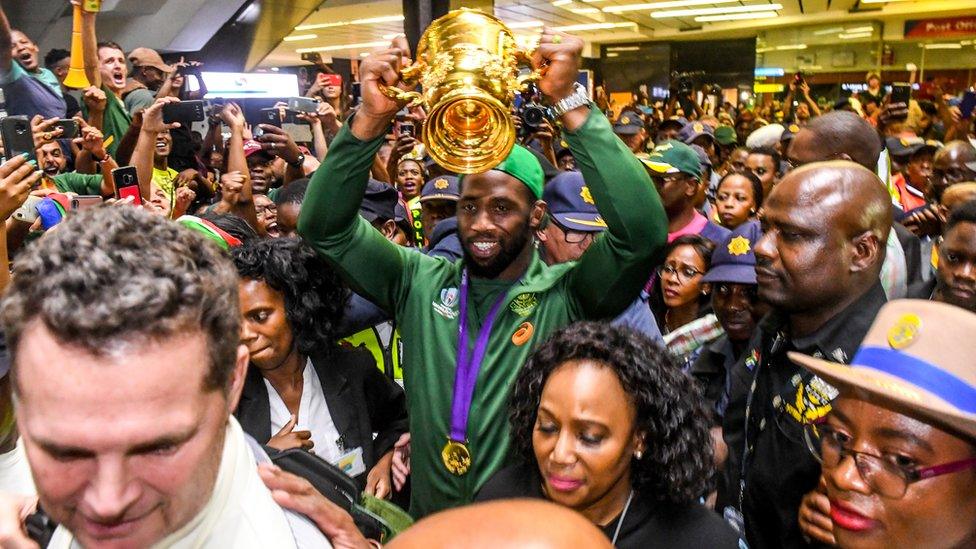
Fifty years on, Siya Kolisi, South Africa's first black rugby captain, returns to Johannesburg with the Rugby World Cup
For those former anti-apartheid demonstrators, it was an "emotional vindication" of their efforts.
"Fifty years ago we protested for exactly what we saw in Japan - a multi-racial team, led by a black captain from an impoverished township who, as a boy, didn't know where his next meal was coming from, let alone where his next rugby ball was going to be kicked," said Lord Hain.
Mrs Francis added: "Watching the World Cup final brought tears - and pride thinking in some little way I helped to bring down that dreadful regime."
- Attribution
- Published3 November 2019
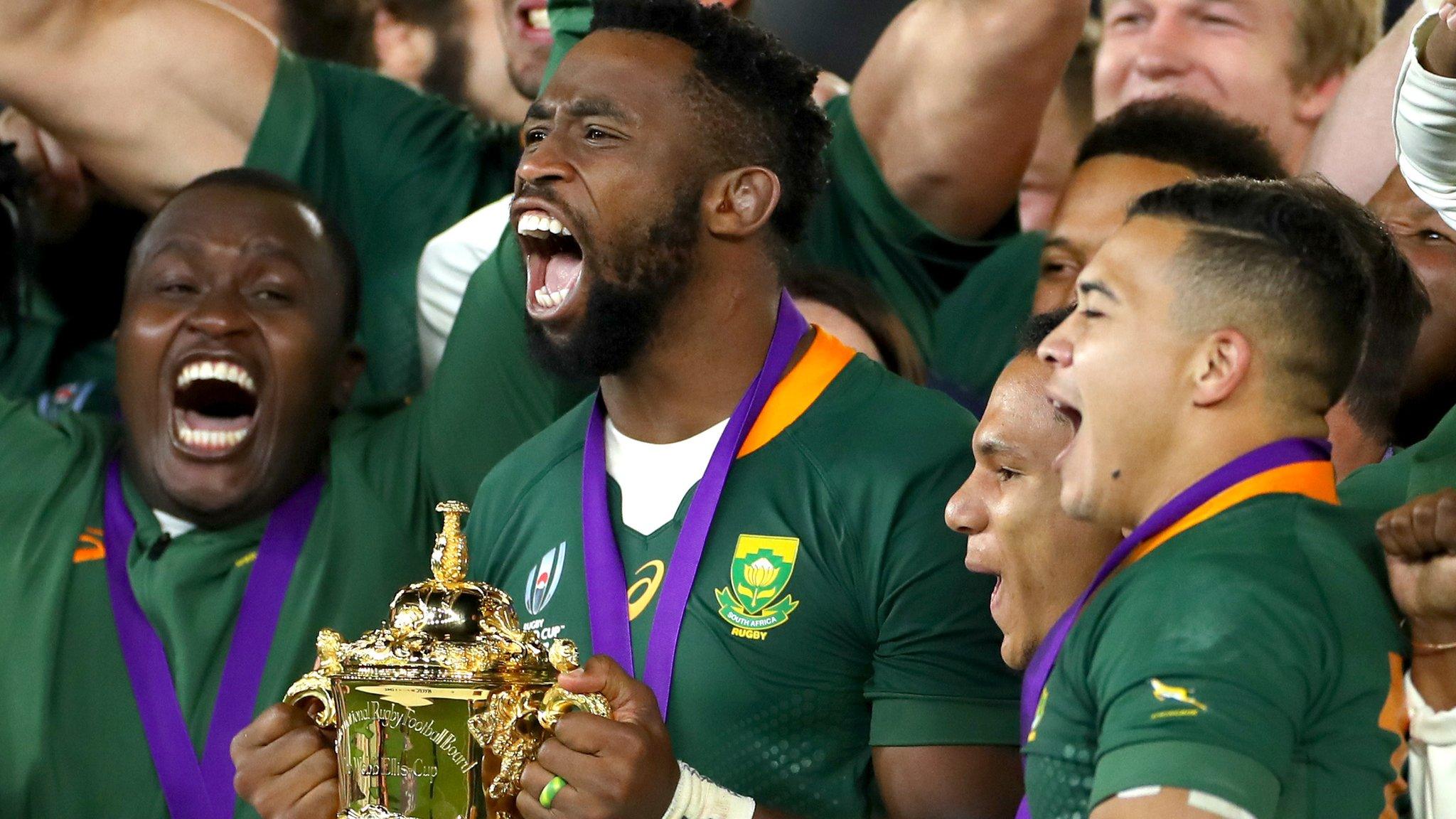
- Published2 November 2019
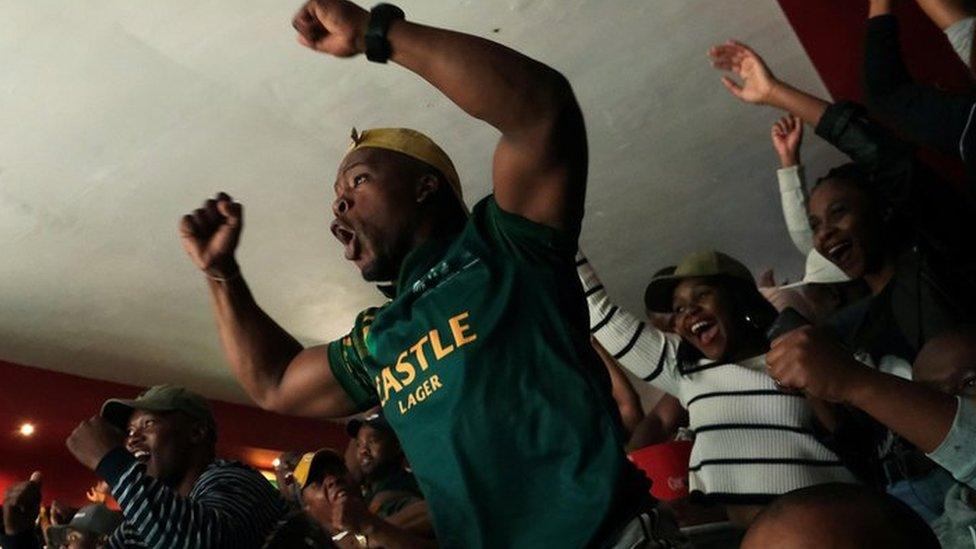
- Attribution
- Published2 November 2019
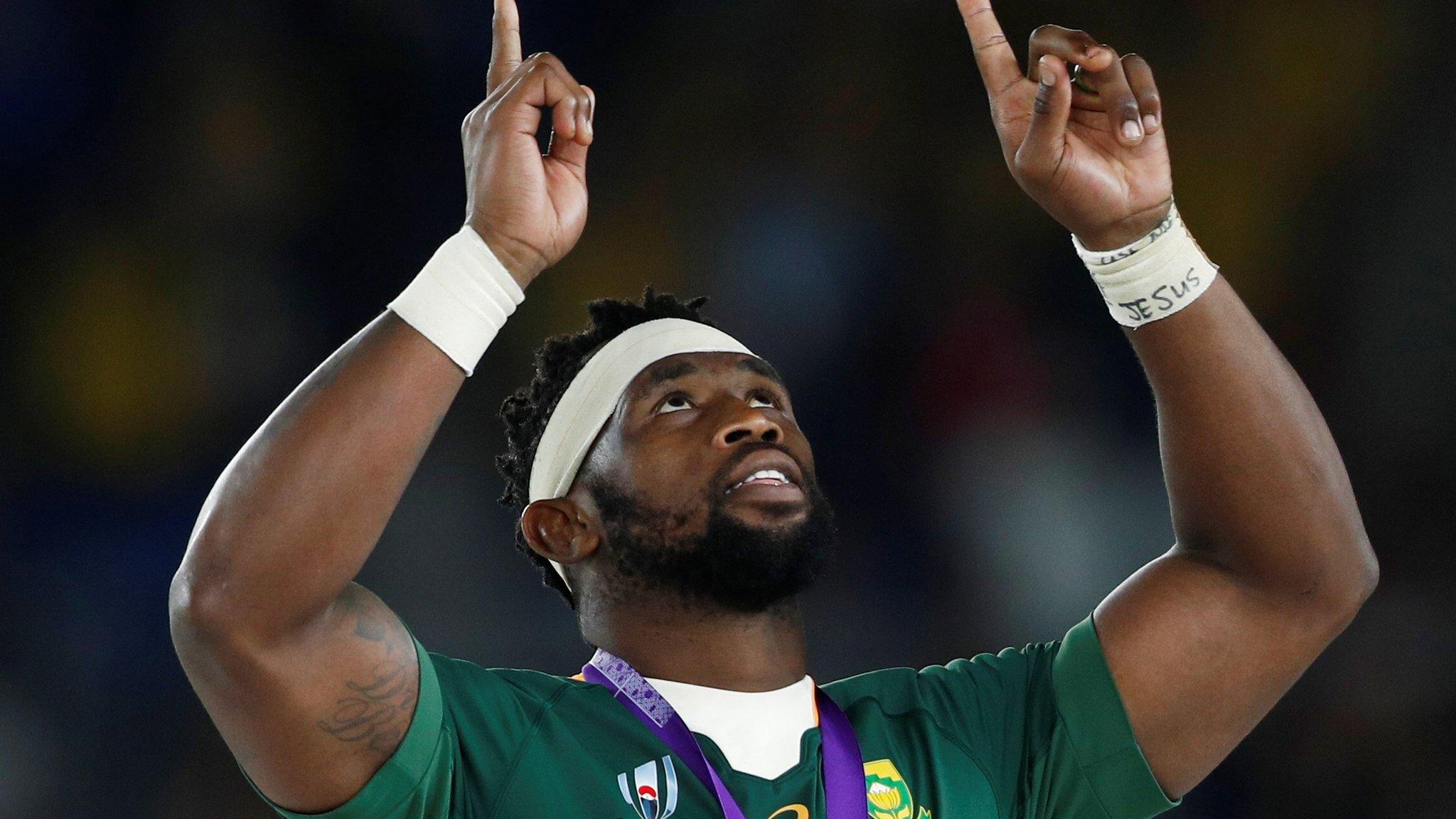
- Published10 November 2019
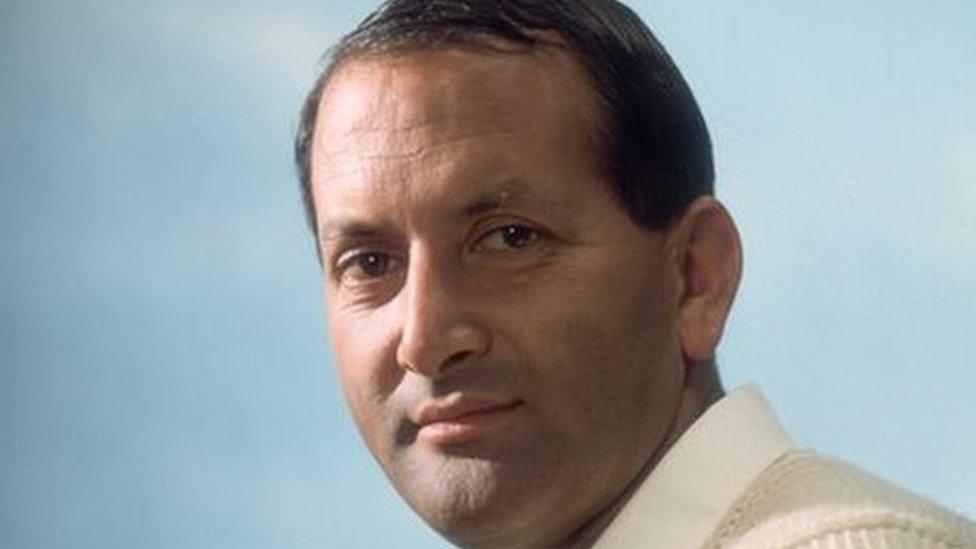
- Published1 May 2014
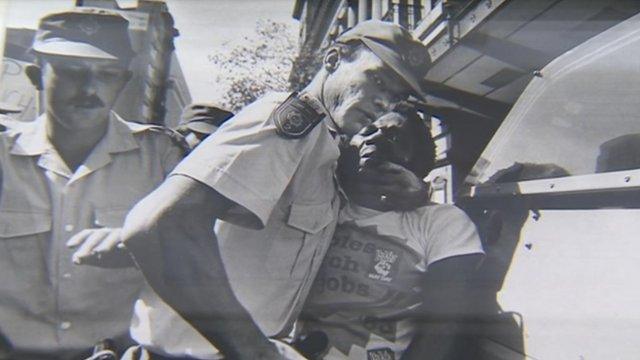
- Published8 December 2013
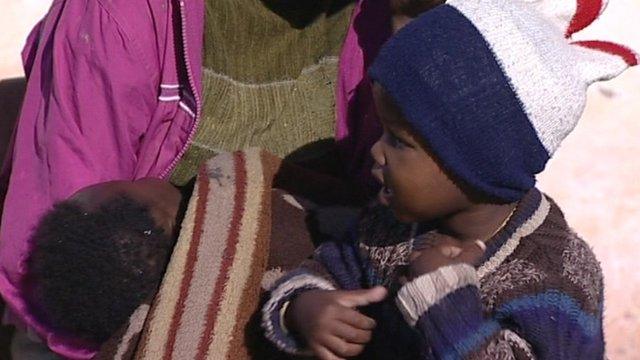
- Published6 December 2013
